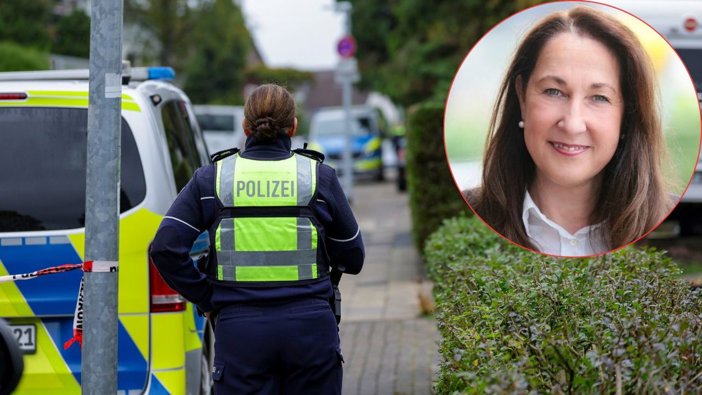
Mayor-Elect Stabbed by Teen Daughter in Germany
Iris Stalzer, the mayor-elect of Herdecke, suffered multiple stab wounds in her home, with police naming her teenage daughter as a prime suspect.
In the town of Herdecke in western Germany, a shocking act of violence unfolded on Tuesday: Iris Stalzer, the newly elected mayor (set to take office November 1), was found gravely wounded in her home after being stabbed multiple times. Authorities say her 17-year-old daughter is now the prime suspect, raising disturbing questions about family conflict, institutional response to prior pleas for help, and political violence in local governance.
Discovery and Initial Response
On October 7, emergency services responded to a distress call to Stalzer’s residence in Herdecke, located in North Rhine-Westphalia. When they arrived, they found the 57-year-old SPD politician with multiple stab wounds. She was immediately airlifted to a hospital and was initially in critical condition. By the following day, hospital officials stated she was no longer in life-threatening danger, though she remained under inpatient care.
Investigators have categorized the case under dangerous bodily harm (“gefährliche Körperverletzung”) rather than attempted homicide. The 17-year-old daughter was taken to a psychiatric facility under guard; her 15-year-old adoptive son is also reportedly under scrutiny by police.
Though initial media reports suggested the daughter claimed an outdoor robbery, authorities now believe the attack occurred inside the home.
Allegations: Torture, Arson Attempts, and a Plea for Help
According to German media outlets citing WDR and Bild, Stalzer’s own testimony recounts a horrifying sequence: she alleges that over several hours, her daughter wielded a deodorant spray and a lighter, attempting to set her hair and clothing ablaze. She claims she was tortured in the basement of her home.
Stalzer further contends that earlier in the confrontation, she persuaded her daughter to spare her and instead contact emergency services. Indeed, investigators discovered that larger blood traces in the house had been cleaned up before the 911 call—suggesting medical distress and damage removal occurred while Stalzer was still alive.
In addition to the attack itself, authorities say there is evidence that prior to the violent episode, Stalzer had repeatedly asked for help. She had contacted police and juvenile authorities multiple times. In June she filed a formal complaint that officials were not providing sufficient assistance; on the day before the stabbing, she attempted contact with police twice seeking protection from domestic violence.
Institutional Response Under Scrutiny
NRW’s Interior Minister Herbert Reul has confirmed that a police internal review is underway to assess whether law enforcement took appropriate measures in response to Stalzer’s prior pleas. He stated that so far, officials believe the required steps were taken, but further scrutiny is necessary.
Authorities say that after her calls to law enforcement, “all necessary measures” were adopted, though they decline to share specifics citing investigative secrecy. The mayor-elect’s requests for assistance—especially on the day before the attack—raise central questions about whether preventive mechanisms failed.
The local youth welfare office (Jugendamt), due to social data privacy restrictions, has issued no comment on past involvement, despite reports of earlier incidents involving the teenage daughter.
Political Standing and Personal Background
Iris Stalzer has lived most of her life in Herdecke, mounting her political career locally. She previously served on its city council and ran jointly as SPD and Green candidate in the 2025 mayoral election, defeating a CDU candidate in a runoff with 52.2% of the vote. Her official mayoral term was to begin November 1.
Stalzer is married and has two adopted children—a girl (born 2007/08) and a boy (born 2009/10). Her successor predecessor as mayor was Katja Strauss-Köster, who recently entered the Bundestag.
Key Questions and Broader Implications
Was this act politically motivated?
Authorities say no. They currently treat it as a domestic family conflict, not politically driven violence. That said, violence against local politicians in Germany is a known concern, drawing attention to personal security for public servants.
Did institutional safeguards fall short?
Stalzer’s repeated attempts to seek help before the attack raise troubling questions about whether protective systems—police response, child welfare oversight, domestic violence protocols—are sufficiently robust. The internal review will aim to identify gaps.
How should public figures protect themselves in intimate spaces?
This case underscores the complexity of balancing approachability with safeguarding, especially for politicians known for close ties to constituents. Enhanced security for home environments, protocols for escalation, and more effective interagency communication may become topics of renewed debate.
What Happens Next?
Investigators continue to gather forensic evidence, interview witnesses, and verify the timeline of events. They are also evaluating whether criminal charges will be altered as more facts emerge. Stalzer, while out of immediate danger, remains hospitalized, and her recovery timeline is uncertain.
Meanwhile, local governance of Herdecke is being conducted by the first deputy mayor until Stalzer resumes duties—or further arrangements are made.
The case will likely become a reference point in German debates on violence against public officials, domestic violence safeguards, and the responsibilities of authorities to intervene before tragedy strikes.
Sources: Reuters AP News WELT Bild WDR People






